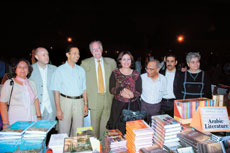AT a high profile event held at the historic Citadel overlooking Cairo, the American University in Cairo Press launched its latest publications. Among them were for the first time a novel, “Wolves of the Crescent Moon” by a Saudi writer, Yousef Al-Mohaimeed who was born in Riyadh in 1964 and who is presently cultural editor of Al-Yamamah magazine. This release is long overdue and one can only hope that more authors from the Arabian Peninsula will be published. Modern Saudi and Gulf literature deserves to be better known outside the region. The author himself said that the translation of his novel into English opens new horizons, not only for him but also for other Saudi novelists.
For centuries poetry was the preferred literary genre in the Arabian Peninsula. In the last few decades, however, poetry has given way to the short story with novel writing definitely gaining momentum. “Wolves of the Crescent Moon” is an interesting example of a novel whose format is highly reminiscent of the short story; its author has in fact written both novels and short stories.
“Many things got me into writing, among them my desire to create and discover new worlds. Moreover, I enjoy sharing my life with the characters in my novels. There comes a time when they actually drink my coffee, wear my shoes and even grab my pen to write in my place” says Mohaimeed.
“Wolves of the Crescent Moon” was first published in 2003 under the title “Fikhakh Al-Raiha” which is literally “The Traps of Scent.” Anthony Calderbank, the novel’s translator, admits that he “personally wanted a title which mentioned the wolf, because not only do wolves play their part in the story, but Turad too is a kind of wolf, and the wolf traditionally is a teacher, mentor and guide.”
The original title “The Traps of Scent” refers to the importance of scent in the novel. The book’s three main protagonists, Turad, the Bedouin, Nasser, the orphan and Amm Tawfiq, the eunuch, all suffer from a physical deformity that can be traced back to scent. As a result, these characters suffer from alienation and loneliness, yet their staunch pride protects them from self-pity and weakness.
Turad, the Bedouin and Amm Tawfiq, the Sudanese, (kidnapped as a child, and sold as a slave) both represent segments of the Saudi population who have played — and are playing — a part in the country’s social fabric and economy. Amm Tawfiq reminds the reader of the vital role played by the expatriate community in Saudi Arabia since the discovery of oil. On the other hand, Turad symbolizes the Bedouin spirit which Wilfred Thesiger described so eloquently:
“All that is best in the Arabs has come to them from the desert: Their deep religious instinct, which has found expression in Islam; their sense of fellowship, which binds them as members of one faith; their pride of race; their generosity and sense of hospitality; their dignity and the regard which they have for the dignity of others as fellow human beings; their humor; their courage and patience, the language which they speak and their passionate love of poetry.”
The novel touches upon difficult issues such as pregnancy out of wedlock, child abandonment as well as child molestation but the most important theme is Turad’s difficult transition from a nomadic life in the desert to a sedentary one in the city. The word ‘Bedouin’ or ‘bedu’ is derived from the Arabic word ‘bedawi’ referring to one who lives in the desert (badiyah); Westerners distorted the plural ‘bedu’ into the word ‘Bedouin’.
The presence of the desert is felt throughout the novel. In a beautiful passage, Al-Mohaimeed describes the Bedouin’s oneness with the landscape:
“When Turad was alone in the desert, all the creatures were his friends. The sand served as his bed, the dune, the hill and the plateau knew him well. The caves opened their hearts to him and offered him shelter. The riverbeds and springs watered him and washed his body, the pasture lands and the fresh desert roots recognized him when he passed. The acacia and awshaz and the sidr offered him shade. The burning embers of ghada logs and samr roots kept him warm on cold desert nights.”
The drastic changes which in half a century have radically transformed Saudi Arabia and nostalgia are powerful themes favored by many contemporary Saudi writers and poets. In a useful note, Anthony Calderbank, tells us that Saudi Arabia “is a vast country where glass-fronted skyscrapers and cutting-edge technology coexist with traditional attitudes and practices rooted in the community’s rich heritage. Yousef Al-Mohaimeed’s novel, “Wolves of the Crescent Moon’, reflects this complex, sometimes poignant, interaction in contemporary Saudi Arabia between old and new, between the ‘badu’, the dwellers of the desert and ‘hadar’, the life of the city”.
Turad’s story echoes the inevitable weakening of the tribal system as Bedouins leave their desert homes for a sedentary life in towns and cities. Once secure in their inaccessibility, Bedouins have had to learn how to survive in an alien atmosphere: The city. Turad’s failure in his solitary desert life prevents him from going back to his tribe where he will be criticized for his defects and reputation. Nomadic culture places great value on personal prowess. In the tribal system, there is no safety in the desert for a man alone or cut off from his tribe and Turad’s name in Arabic actually suggests exile and displacement.
This incisive and touching novel with troubling insights into Saudi society ends with a ray of hope as Amm Tawfiq provides the lonely Turad with a sincere and disinterested friendship, the key to survival in the city. “This novel has many themes. One of them is the suffering of the lower classes. I am also touched when I hear about people running away from heartbreaking misfortunes only to find themselves facing new tragedies,” concludes Yousef Al-Mohaimeed.


